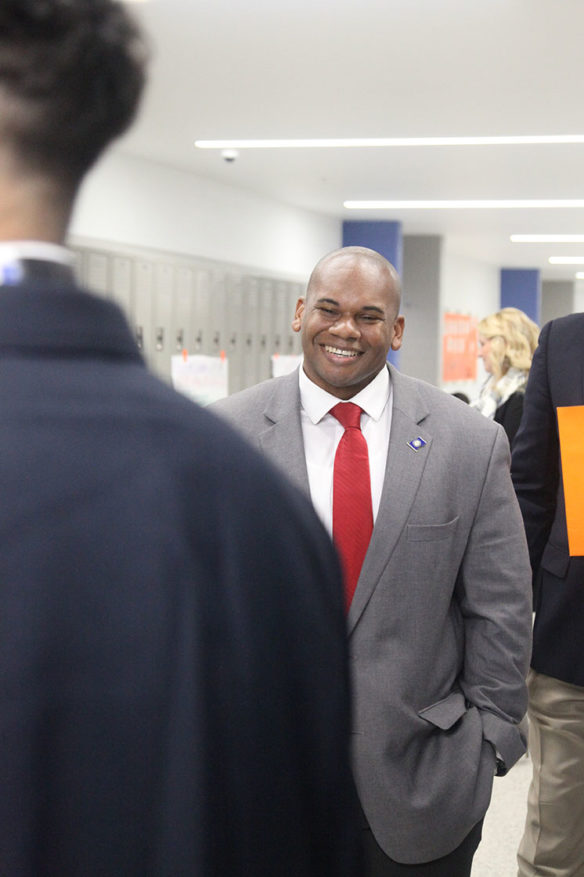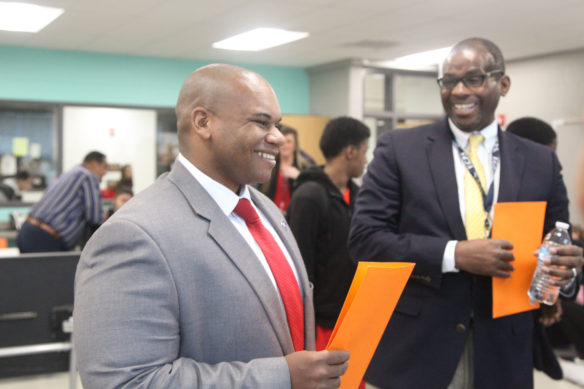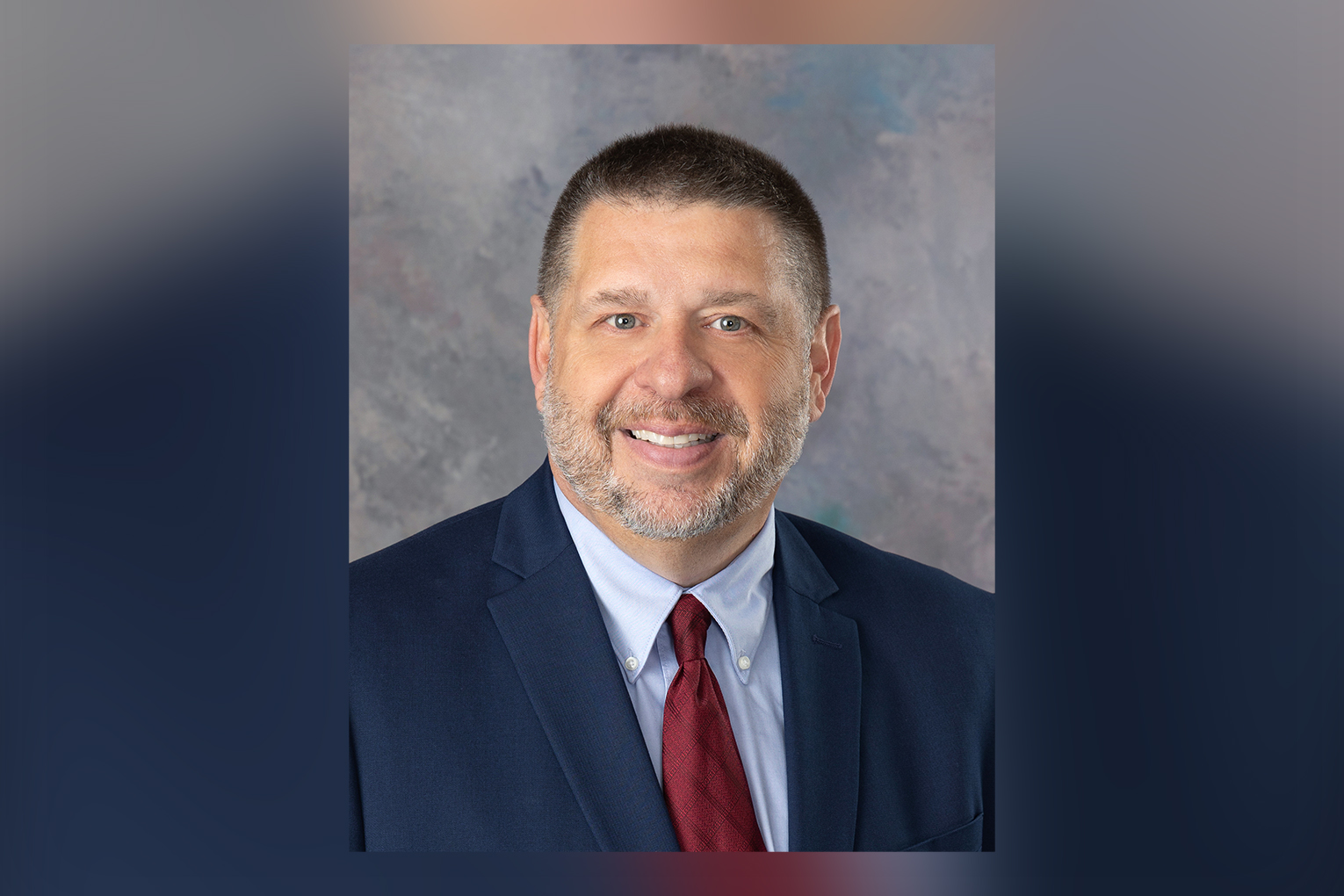
Wayne Lewis talks with a student at Frederick Douglass High School (Fayette County) about the academies offered there during a visit to the school. Lewis, who began his career in education as a special education teacher in his native Louisiana, was named Kentucky’s seventh commissioner of education earlier this year.
Photo by Megan Gross, Dec. 3, 2018
By Mike Marsee
michael.marsee@education.ky.gov
Wayne Lewis loved the life he had before Hurricane Katrina devastated his native New Orleans and the surrounding area in August 2005. He and his wife had bought their first home only two months earlier and he was happy in his work as a special education teacher.
There was no way he could know that the storm bearing down on his hometown would change everything – first for worse, then for better – or that it would set him on a course that would lead him to become Kentucky’s commissioner of education.
If it hadn’t been for the storm …
“I’d still be in Louisiana, and it’s highly likely that I would still be a classroom teacher,” Lewis said.
Lewis’ role as commissioner is the latest step in a career in educational leadership that began with his decision to pursue a doctorate degree at North Carolina State University in Raleigh, N.C., where he and his wife landed after realizing their life in the New Orleans area could never be what it was before Katrina.
“Life was good,” he said. “We were starting our lives as young adults together, starting to talk about when we were going to be ready to have a family. I thought eventually maybe I’d go back to school, maybe I wouldn’t. But I was really, really happy. I loved my school, loved my kids, loved my church. If you go back to a day, two days before Katrina, and you ask me what I was going to be doing in 10 years, I probably would have told you, ‘I’m going to be here in St. Charles Parish Public Schools.’”
As Katrina targeted the Gulf Coast, Lewis and his wife Monica evacuated to Texas, where they rode out the storm with family members in Austin for a week. They returned to a home rendered uninhabitable by 13 feet of flood waters. They returned to work at their respective teaching jobs and they lived on the second floor of a fire station for about a month.
“My wife wasn’t a big fan of living in a fire station on an air mattress. There was a computer downstairs, and after we’d been there a couple weeks, we’d go down and apply for jobs all over the country,” Lewis said. “We ended up in Raleigh because we both got calls from Wake County Public Schools the same day, interviews for different schools.”
“But that experience is really important to me, Even though it was only a month’s time, we were homeless. It really sunk in for us after we got the jobs in Raleigh and got an apartment, we got those keys and it was like, ‘We have a place to live again.’”
Lewis came to Kentucky in 2009 and he held several positions in the University of Kentucky College of Education before he was named executive director of education policy and programs in the Kentucky Education and Workforce Development Cabinet in June 2016. He was named interim commissioner of education in April 2018.
The Kentucky Board of Education named Lewis Kentucky’s seventh commissioner of education in October, approving a four-year contract.
He discussed some of the experiences that led him to this position with Kentucky Teacher:
What is the best thing that has happened for you since you became commissioner?
“I think it has been the reception of the folks at KDE. The leadership team has been extraordinary, and that’s who I work with on a daily basis, but not just the leadership team, the entire agency. Even on the first day, I was greeted with professionalism and got a warm reception from the KDE staff.”
What is the best thing that has happened for education in Kentucky during your time in this position?
“What I’m most excited about – and it’s still in progress – is the potential for the change we’re proposing for high school graduation requirements. We’re definitely not far enough along to talk about outcomes, but that proposed change has the potential to have a tremendous impact on the education and workforce outcomes and the life outcomes of Kentuckians for generations.”
Did you sense the emphasis on education in your household at an early age?
“With my family – my parents, first and foremost, but also grandparents and aunts and uncles – there was never a time in my life when I don’t remember education being a top priority. It was always emphasized at home, and there was the expectation that I was going to do well in school, that I was going to study hard. There was never a question with my family of whether or not I was going to college.”
Both of your parents pursued college degrees during your childhood. What was it like to study alongside them at times?
“I can remember being on campus in community college classrooms with my dad when I was a little kid, in kindergarten or 1st grade. This one incident we still laugh about: My dad worked third shift and he fell asleep in class. The professor told me to wake my dad up.

Commissioner of Education Wayne Lewis, left, talks with Fayette County superintendent Manny Caulk during a visit to Frederick Douglass High School (Fayette County). Lewis said he has always been in awe of great teaching, and that he looks for it during school visits.
Photo by Megan Gross, Dec. 3, 2018
”Who were your favorite teachers?
“In grade school, it was my 7th-grade social studies teacher, Bill Snider. I wanted to be a doctor until his 7th-grade social studies class. That was where I fell in love with history and government. He was also my quiz bowl and academic games coach, so it wasn’t just the classroom time, there was after-school time, getting to know each other personally, going to competitions. That’s when teachers really get to take interest in who kids are as students.
“In high school, it really became my music teachers. My principal was also the jazz band director, he was a saxophone player like me. I had a really great relationship with him. We had a family connection as well because he played saxophone with my uncle.”
Do you still play the saxophone?
“Not in public. I used to play out quite a bit up until I had my little girl in 2014. That’s how I first got to know the state, traveling around and playing music with several groups. Every once in a while I’ll pull it out, but I don’t think I’ll ever return to really playing it.
“Even though I’ll never play professionally again, I grew up as a music kid. From age 8 probably through age 21, there probably were very few days of my life that I wasn’t playing a saxophone. It was a big part of my schooling, but also, growing up in a city like New Orleans, it’s a big part of the culture. I wanted to attend my high school from the time I was a little kid because of its marching band. The band I was in in high school was known for leading all the Mardi Gras parades.
“To this day, people laugh at me – my wife even laughs at me – when I say outside of the birth of my daughter, when I think about the things I’m most proud of in my life, it’s earning a Ph.D., earning tenure and becoming drum major of my high school marching band. Becoming drum major might be first, to be honest with you.”
You didn’t pursue a career in education until after graduate school. What pulled you toward special education?
“When I decided I wanted to go into teaching, I didn’t really know anything about special education or about emotional and behavioral disorders. I just knew I wanted to be a teacher. I had an opportunity before I chose a specific pathway to learn about different possibilities. Through that exploration and getting to learn more about that population, it just clicked with me because those kids have such a high likelihood of ending up in the criminal justice system.
“I remember being in college, working as a deputy sheriff, working primarily in corrections, I was subbing at the juvenile detention facility. I just remember thinking, ‘There’s got to be a way to reach those kids before they get here.’ Because once they get there, even though they’re not going to stay in the juvenile facility, so many of those kids are going to end up right back in the system.”
Your experiences studying criminal justice and working for the local sheriff’s office sparked your passion for at-risk students. How can you help others acquire that same passion?
“One way is by having conversations with those students. I think the more we have the opportunity to hear directly from young people, and as much as possible witness and observe some of the challenges that kids face and really get to understand kids’ stories, I think it gives us a fresh perspective on what some of them are facing. The challenges some of these kids are facing just don’t look like the daily challenges of my daughter. Our lives are just very, very different. Hearing directly from those kids, seeing it for yourself, I don’t think there’s any substitute.”
What do you miss most about being in the classroom on a daily basis?
“Kids are really, really funny. I still laugh sometimes about some of the crazy stuff kids say and do. I live it through my wife because she’s still in a school, but I really miss that.
“The other thing that I miss is the camaraderie of the staff, the teachers in a school. I think that’s really special. I still have close relationships with the teachers that I taught with both in St. Charles Parish and in Wake County. I get to experience it a little bit on Facebook, but it’s not the same as getting to hang out on Fridays, going out, watching games together.”
You’re getting to visit more schools now than during your time as interim commissioner? What do you look for when you visit a school?
“When I go into a school, I very intentionally try to go with my eyes wide open and try to experience everything. I go into a classroom trying to see what it feels like. What are the kids learning? Are they engaged? Are they happy? What’s the teacher’s style, their approach? And more than anything, I want to make sure I have the opportunity to appreciate what’s happening.
“One of the most magical things that I think happens in schools is great teaching. When you walk into a classroom, you know when great teaching is happening, and it just kind of stops you in your tracks. Great teachers have a combination of natural ability and disposition, put together with skill and training over time. It makes me want to just sit in a corner and observe. In my time in education, I’ve always been in awe of really great teaching.”
Your 4-year-old daughter has entered preschool. How much do you think about the impact of your work and the work of KDE on her education?
“I recognize that being commissioner and before that being a professor, and with my wife being an educator, my kid’s going to get a good education. She just is. We bought our house and we chose her school because we feel good about the school and we know she’s going to get a great education.
“I do think quite a bit about the impact of our work on her education, but I think a whole lot more about the impact of our work on kids whose parents don’t have the type of resources and social capital that we have. I think about that a lot more.”




Leave A Comment